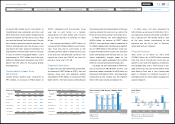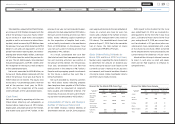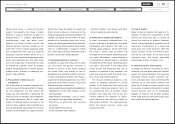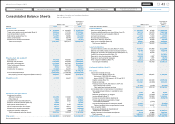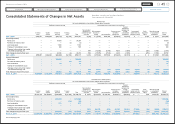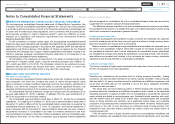Mazda 2014 Annual Report Download - page 43
Download and view the complete annual report
Please find page 43 of the 2014 Mazda annual report below. You can navigate through the pages in the report by either clicking on the pages listed below, or by using the keyword search tool below to find specific information within the annual report.
Mazda brand value, is crucial to ensuring
growth. Consequently, the Group is imple-
menting a range of initiatives to boost its
competitiveness in product development,
manufacturing, sales, and other areas.
However, the Group’s business results and
financial position could be affected in the
event that it fails to launch appealing prod-
ucts at opportune times, due to a failure to
accurately ascertain market trends or as a
result of issues related to technological capa-
bilities and manufacturing. The same holds
true if the Group fails to take effective steps
to respond to customer values or changes
thereof, including declines in market share or
product prices, through its dealership net-
work or sales methods.
6. Procurement of Materials and
Components
The Group relies on numerous suppliers out-
side the Group for the procurement of materi-
als and components. For that reason, the
Group may face difficulties in procuring the
necessary level of materials and components
for volume production, due to supply con-
straints or reduced logistics functions in the
event of these suppliers being affected by a
disaster, due to tight supply balances, or due to
changes to and breaches of supply contracts.
Should the Group be unable to absorb the
effects of any increases in the prices of the
materials being procured by the Company—for
example, by making internal efforts to boost
productivity or passing on price rises to cus-
tomers—or should procured materials and com-
ponents be of insufficient quality, the possibility
exists of a deterioration in output or higher
costs, which could adversely affect the Group’s
business results and financial position.
7. International Business Activities
In addition to Japan, the Group sells its prod-
ucts and carries out business activities in
markets in all parts of the world, including
the United States and Europe, as well as
developing and emerging markets overseas.
In these international markets, the Group is
subject to the following potential risks, which
could affect the Group’s business results and
financial position if manifested:
• Adverse political and economic developments
• Impediments arising from changes in laws
and regulations
• Import/export regulations, such as tariffs,
detrimental taxes and other regulations
• Difficulties in attracting and securing
personnel
• Undeveloped infrastructure
• Strikes and other labor disputes
• Terrorist incidents, war, disease, and other
factors leading to social disorder
8. Protection of Intellectual Property
In order to maintain competitiveness, the
Group is working to accumulate and protect
technologies and expertise that help it to
develop unique products. At the same time,
the Group is taking steps to prevent the
infringement of third-party intellectual prop-
erty rights. Nonetheless, should differences
in recognition or opinion lead to a disputed
infringement of third-party intellectual prop-
erty rights that results in the Group being
forced to halt the production and sale of
products, or needing to pay damages, this
could also adversely affect the Group’s busi-
ness results and financial position.
The Group’s intellectual property is not
subject to complete protection in certain
regions. In the event that third parties use
the Group’s intellectual property rights on
an unauthorized basis to produce similar
products, the Group may have to pay sub-
stantial expenses for litigation, or experi-
ence a decline in sales due to an inability to
offer unique products. This could adversely
affect the Group’s business results and
financial position.
9. Product Quality
While striving to improve the quality of its
products to meet the requirements of the
market, the Group also does its utmost to
ensure the safety of its products. However,
should a defect develop in a product due to
unforeseen circumstances or a large-scale
recall occur, this could adversely affect the
Group’s business results and financial posi-
tion due to such factors as the incurring of
significant costs, the Group’s diminished
brand image, and loss of market trust.
10. Natural Disasters and Accidents
In addition to measures to protect its manu-
facturing sites and other important facilities
against fire and earthquakes, the Group has
concluded natural disaster insurance con-
tracts and taken other steps to minimize the
financial risk of such events. However, the
ability of the Group to supply products may
be severely disrupted in the event of a major
natural disaster, such as an earthquake,
typhoon, or flood, or fire or other accident,
which could adversely affect the Group’s busi-
ness results and financial position.
41
Mazda Annual Report 2014
CONTENTS
Foundations Underpinning
Sustainable Growth
Financial Section
Review of Operations
Message from Management
Introduction
Brand Value Management









